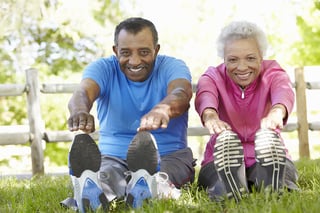
A Holistic Approach to Aging Well
Updated from the original publication on August 23, 2016.
 Seniors all over the world are taking a stand—defying the stereotypes that have been placed on them by society. You're too old…you're not social…your mind isn't what it used to be…you're unproductive…you're not creative…your health has declined. The list goes on and on. These stereotypes are actually a part of a larger problem called ageism—the discrimination against individuals or groups of people based on their age.
Seniors all over the world are taking a stand—defying the stereotypes that have been placed on them by society. You're too old…you're not social…your mind isn't what it used to be…you're unproductive…you're not creative…your health has declined. The list goes on and on. These stereotypes are actually a part of a larger problem called ageism—the discrimination against individuals or groups of people based on their age.
Ageism is apparent in the media, in everyday language we use, and the humor we share between friends. Phrases like "over the hill" and "old fuddy-duddy" make the aging process sound less than desirable. However, aging in many ways signifies new life. It's the start of new and exciting beginnings—the chance to do the things you never got around to doing until now. For many, it's the opportunity to take on new hobbies or simply give back in ways others have given to them.
And with these tips you can learn how to age well, no matter what age you are.
1. Learn and Use New Technology
Technology certainly changes the way people age and engage with the world around them. In addition to the programs offered through a partnering agreement with Generation Connect, Presbyterian Senior Living communities use advances in technology to help seniors learn about using tablet technology and may enhance their mental fitness. Many of our Personal Care and Assisted Living communities use the It's Never 2 Late®, dignity through technology system. It's Never 2 Late® is an easy to use touchscreen system that's prepackaged with engaging content to help seniors—specifically those with dementia and memory loss—improve socialization skills and increase quality of life. Residents use the system to safely browse the Internet, access email, and communicate with family members through private video conferencing.
With 10,000 Baby Boomers crossing the 65-year-old threshold every day, technology will continue to become increasingly important to meeting the needs of aging adults. According to PewResearchCenter, the typical Boomer feels nine years younger than they actually are. This affects how seniors view themselves and perceive the world around them. Jacqui Smith, a psychologist from the University of Michigan Institute of Social Research says, “It’s good for us to think we’re a little better than we actually are." She believes positive thinking and active lifestyles are associated with feelings of hope and well-being.
2. Take Care of Your Body
 Aging is a natural part of life. Gray hairs, wrinkles, and body aches; these are the typical first signs of aging we see. Some say it's inevitable, but is it really? While we might get a little rounder in our midsection or wake up to stiffer joints in the morning, evidence suggests the aging process can be reversed. The question is: Are you ready to fight back?
Aging is a natural part of life. Gray hairs, wrinkles, and body aches; these are the typical first signs of aging we see. Some say it's inevitable, but is it really? While we might get a little rounder in our midsection or wake up to stiffer joints in the morning, evidence suggests the aging process can be reversed. The question is: Are you ready to fight back?
Nutritional intake and exercise as well as rest and relaxation are important factors in taking care of your body. Yoga is one residents’ favorite activity to keep bodies strong and healthy.
Performing yoga several times a week may help improve flexibility, boost heart health, reduce some types of chronic pain and ward off depression. Yoga may also benefit your lymphatic system by promoting circulation of the lymph fluid through all lymph node channels. Because lymph fluid does not get pumped through the body like blood, contracting and stretching your muscles by performing yoga poses promotes the flow of lymph fluid. Maintaining lymph fluid action is important for eliminating bacteria or viruses that cause infections.
Yoga is just one way out of many to take care of your body as you age.
3. Take Care of your Brain
Seniors especially need to engage in brain fitness exercises to stimulate the "thinking" part of their brain--the frontal lobe. Necessary for maintaining cognitive skills, memory, judgment, problem solving and motor functioning, your frontal lobe could be considered the "cockpit" of your brain. Imagine an airplane without a cockpit--it couldn't fly or taxi down the runway. In fact, it couldn't do anything except take up space!
Some great ways to take care of your brain, beyond physical exercise, include artistic endeavors, learning a second language, doing puzzles, reading, writing and using online brain fitness games.
4. Volunteer and Stay Social
In a guest column for McKnight’s, Presbyterian Senior Living’s CEO, Stephen Proctor, wrote that volunteering is so beneficial for seniors, it might even be the elusive “fountain of youth.” Recent studies have found that participating in volunteer activities can lessen depressive symptoms and improve both cognitive and physical function.
A study of participants in AARP’s Experience Corps found that volunteers showed improvements in both physical and mental health along with an apparent delay in the onset of problems related to aging. Specifically, the study found that volunteers experienced:
- Fewer limitations in their physical abilities.
- A slower decline in health because of aging.
- A reduced risk of depression.
- Increased physical activity.
- Greater engagement in the local community.
- A larger number of friends.
- A feeling of optimism about life.
- Better memory capacity.
Another study looked at several types of productive activities — volunteering, working and providing care — and found that volunteering had the strongest relationship to reduced levels of inflammation. The results were most prominent in the group of study participants over the age of 70.
Research has found that volunteers demonstrate better self-esteem and are more connected with others. At Presbyterian Senior Living, CEO Proctor wrote, volunteering provides social, intellectual, physical and spiritual challenges that allow residents to lead healthier and more fulfilling lives.
5. Embrace Successful Aging
What does it mean to truly live well as we age? Thanks to the Masterpiece Living program, we have clear answers.
The Masterpiece Living program was created as a product of the landmark MacArthur Foundation Study on Aging. The program, based on data and thoroughly tested, assists senior living organizations in creating supportive environments to help aging individuals thrive. The program is built on the concept that successful aging requires several vital components:
- Engaging socially with others.
- Developing a sense of purpose and meaning in life.
- Maintaining a lifestyle that is physically active and mentally challenging.
- Being in a supportive atmosphere.
At Presbyterian Senior Living, the Masterpiece Living program is changing the experience and perception of aging on a daily basis.
Want to know more about aging well? Subscribe to our blog for tips on healthy aging, caregiving and more.
About Presbyterian Senior Living
As the trusted leader in aging services, Presbyterian Senior Living combines over 95 years of experience with innovative approaches to senior communities and services. Across our 27 communities in PA, MD, OH, and DE, we serve over 6,500 seniors. We are committed to: FOSTERING teamwork and responsibility. UPHOLDING integrity in every action. EMBRACING innovation to create opportunities for everyone’s success. LEADING with compassion and respect.

